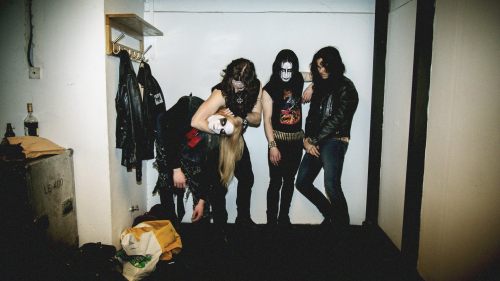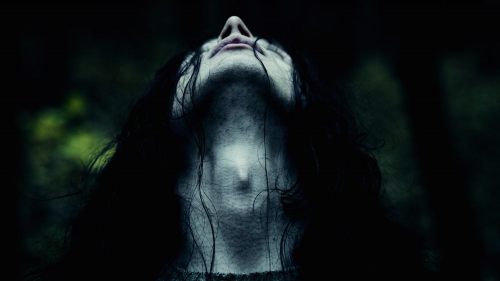LORDS OF CHAOS Rewrites Metal’s Mythology
Lords of Chaos is in Theaters and ON Demand now. Get your tickets here!
Euronymous, founder of Norwegian black metal band Mayhem, had a styrofoam tombstone in the window of his record shop. The store was called Helvete, which translates to Hell. The space was a rallying point for Oslo’s first wave of black metal bands and their fans. A crypt-like basement became a clubhouse for the owner’s coterie of confidants, his “Black Circle.” If you were true enough, CVLT enough, hateful enough — or if you just wanted to be — you hung out at Helvete. But the tombstone was a cheap fake.
The truth of the tombstone doesn’t really matter. Mayhem wasn’t just a band. It was an entire mythology created by Euronymous, real name Øystein Aarseth — a tale of power and self-realization that nearly became true because it was too crazy not to. It was an invented identity for him and his friends, and ultimately one of the best sales pitches in underground music. Mayhem’s founder was a terrific guitar player and an even better promoter, willing to play loose with image and honor. Because he was murdered at age 25, Euronymous is held up as an icon, even a martyr, in the metal scene. Never mind that he took part in the arson of a church and was maybe a Nazi.
With Rory Culkin’s transformative performance front and center, Lords of Chaos recounts the life and death of Euronymous (Culkin), who in 1993 was murdered by former bandmate Kristian “Varg” Vikerns. Fond of its subjects but far from reverent, the film celebrates Mayhem’s music while openly mocking attitudes held by band members and condemning their most extreme actions.
Entire subsets of metal fandom are built on a contradiction. Extreme music deliberately courts the ridiculous while maintaining a serious face. The concept of authenticity is all-important. Theatricality contributes to the illusion of legitimacy just as much as musical chops. That cognitive dissonance is the elephant carcass in the room, to be confronted only in extreme scenarios. Euronymous only did so, according to Lords of Chaos, when on the brink of death.
Lords of Chaos accurately depicts Mayhem’s unusual and showy image, which was compounded by the emotional instability of singer Per "Dead" Ohlin (Jack Kilmer). Dead’s practice of self-harm while on stage erased any question of Mayhem’s authenticity — and was shamelessly exploited by Euronymous long after the singer had the ability to do anything about it. The severity of Dead’s actions doesn’t change the fact that the black metal folklore built up around him is absurd, even dangerous.
Guided by director Jonas Åkerlund, who was part of Sweden’s metal underground in the early ‘80s, Lords of Chaos confronts Mayhem’s contradictions right from the start. The script, which is noted to be “based on truth... and lies,” exaggerates and perhaps even falsifies facts about Euronymous. The guitarist probably never growled “I give you true Norwegian black metal,” as he does in one early scene. But I believe, unquestioningly, that he thought it.
Instead of a strict adherence to fact, Åkerlund approaches Werner Herzog’s idea of ecstatic truth. This is a “mysterious and elusive” understanding, as Herzog said, which “can be reached only through fabrication and imagination and stylization.”
So the introduction of Kristian “Varg” Vikerns (Emory Cohen) as a shy scene wannabe ignores a few facts. Most important: He was already an established player, in the band Old Funeral. (That band became Immortal, which is perhaps the greatest example of how to successfully straddle the line between legitimate and ludicrous.)
Lords of Chaos ignores that detail, and several other facts about Vikerns. Yet the portrayal of Varg does emphasize the schism between authenticity and theatricality. Varg’s grim embrace of Mayhem’s mythology, which led to arson and murder, only emphasizes the fiction’s instability. None of the image Euronymous cultivated was meant to be literal.
This is going to sound like an attack, but Lords of Chaos and Bohemian Rhapsody are similar in more than a few ways. The Freddie Mercury blockbuster creates crucial contrast for Åkerlund’s movie. Bohemian Rhapsody accepts as given that Queen’s mythology is not only legitimate, but perhaps too limited to represent the band. As grotesque as the Bryan Singer/Dexter Fletcher movie can be in its (mis)representation of fact, that unquestioning acceptance of image is the most galling. By criticizing and even deflating Mayhem’s self-made legends, Lords of Chaos is honest and, yes, ecstatic, regardless of whether or not it is true.


